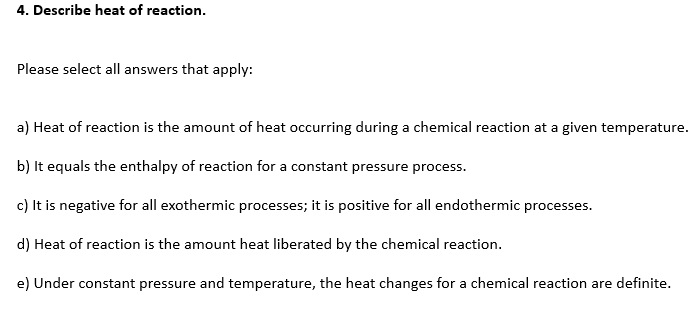3. What is adiabatic temperature in a combustion? Please select all answers that apply: a) Adiabatic flame temperature is the maximum flame temperature for gaseous HC burning in oxygen or air b) Adiabatic flame temperature is the same as total temperature. c) Adiabatic flame temperature is achieved when kinetic energy reduces to a small values. d) Adiabatic flame temperature is achieved when kinetic energy reduces to zero. e) Adiabatic flame temperature is achieved when there is no heat transfer.
3. What is adiabatic temperature in a combustion? Please select all answers that apply: a) Adiabatic flame temperature is the maximum flame temperature for gaseous HC burning in oxygen or air b) Adiabatic flame temperature is the same as total temperature. c) Adiabatic flame temperature is achieved when kinetic energy reduces to a small values. d) Adiabatic flame temperature is achieved when kinetic energy reduces to zero. e) Adiabatic flame temperature is achieved when there is no heat transfer.
Refrigeration and Air Conditioning Technology (MindTap Course List)
8th Edition
ISBN:9781305578296
Author:John Tomczyk, Eugene Silberstein, Bill Whitman, Bill Johnson
Publisher:John Tomczyk, Eugene Silberstein, Bill Whitman, Bill Johnson
Chapter32: Oil Heat
Section: Chapter Questions
Problem 12RQ: When incomplete combustion occurs, what additional by-products of combustion are created?
Related questions
Question

Transcribed Image Text:3. What is adiabatic temperature in a combustion?
Please select all answers that apply:
a) Adiabatic flame temperature is the maximum flame temperature for gaseous HC burning in oxygen or air.
b) Adiabatic flame temperature is the same as total temperature.
c) Adiabatic flame temperature is achieved when kinetic energy reduces to a small values.
d) Adiabatic flame temperature is achieved when kinetic energy reduces to zero.
e) Adiabatic flame temperature is achieved when there is no heat transfer.

Transcribed Image Text:4. Describe heat of reaction.
Please select all answers that apply:
a) Heat of reaction is the amount of heat occurring during a chemical reaction at a given temperature.
b) It equals the enthalpy of reaction for a constant pressure process.
c) It is negative for all exothermic processes; it is positive for all endothermic processes.
d) Heat of reaction is the amount heat liberated by the chemical reaction.
e) Under constant pressure and temperature, the heat changes for a chemical reaction are definite.
Expert Solution
This question has been solved!
Explore an expertly crafted, step-by-step solution for a thorough understanding of key concepts.
This is a popular solution!
Trending now
This is a popular solution!
Step by step
Solved in 2 steps

Knowledge Booster
Learn more about
Need a deep-dive on the concept behind this application? Look no further. Learn more about this topic, mechanical-engineering and related others by exploring similar questions and additional content below.Recommended textbooks for you

Refrigeration and Air Conditioning Technology (Mi…
Mechanical Engineering
ISBN:
9781305578296
Author:
John Tomczyk, Eugene Silberstein, Bill Whitman, Bill Johnson
Publisher:
Cengage Learning

Refrigeration and Air Conditioning Technology (Mi…
Mechanical Engineering
ISBN:
9781305578296
Author:
John Tomczyk, Eugene Silberstein, Bill Whitman, Bill Johnson
Publisher:
Cengage Learning